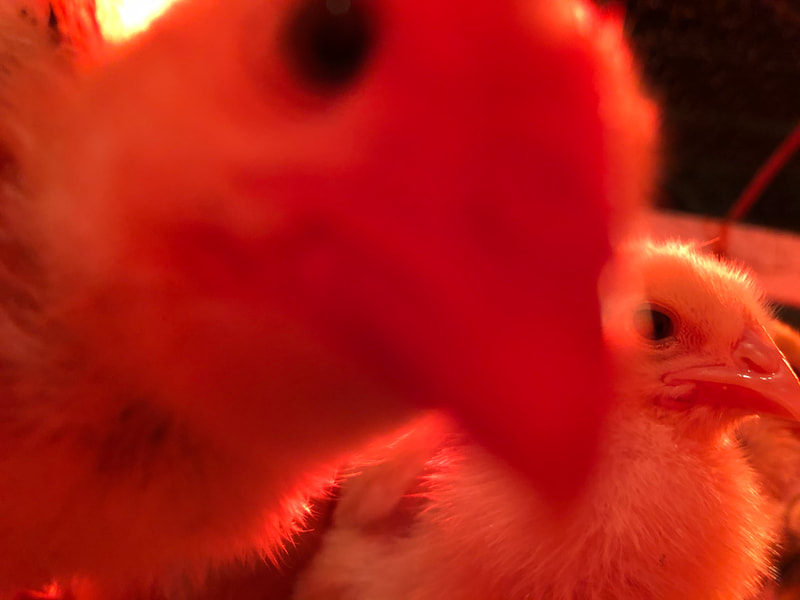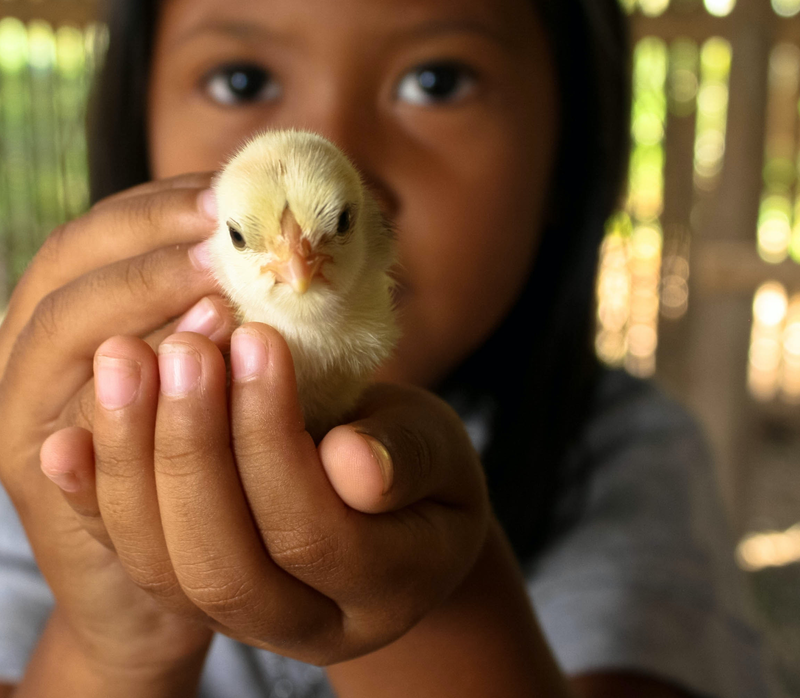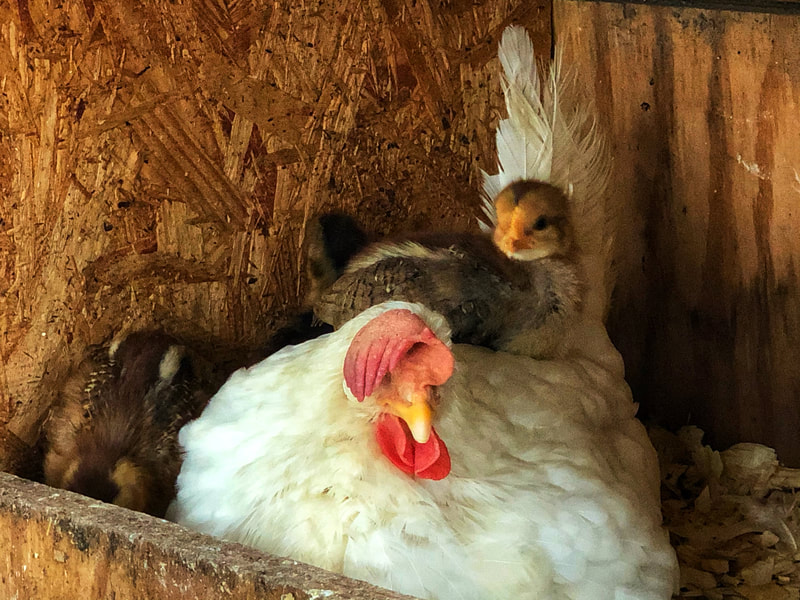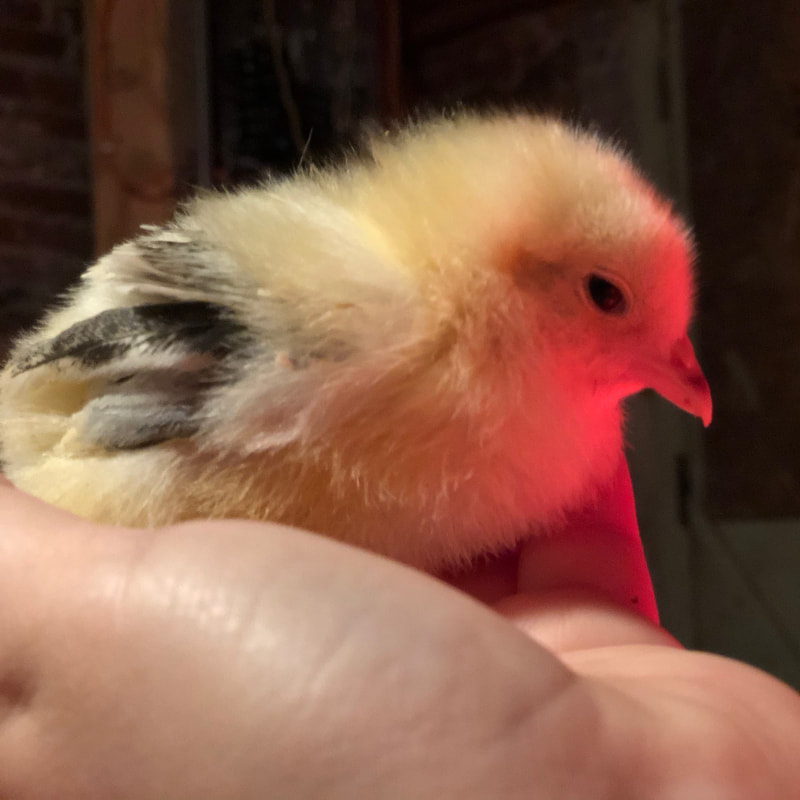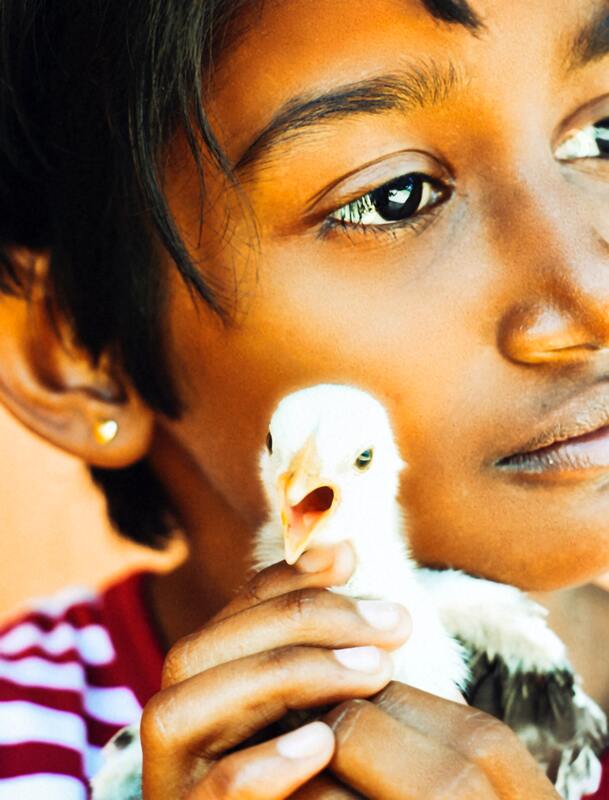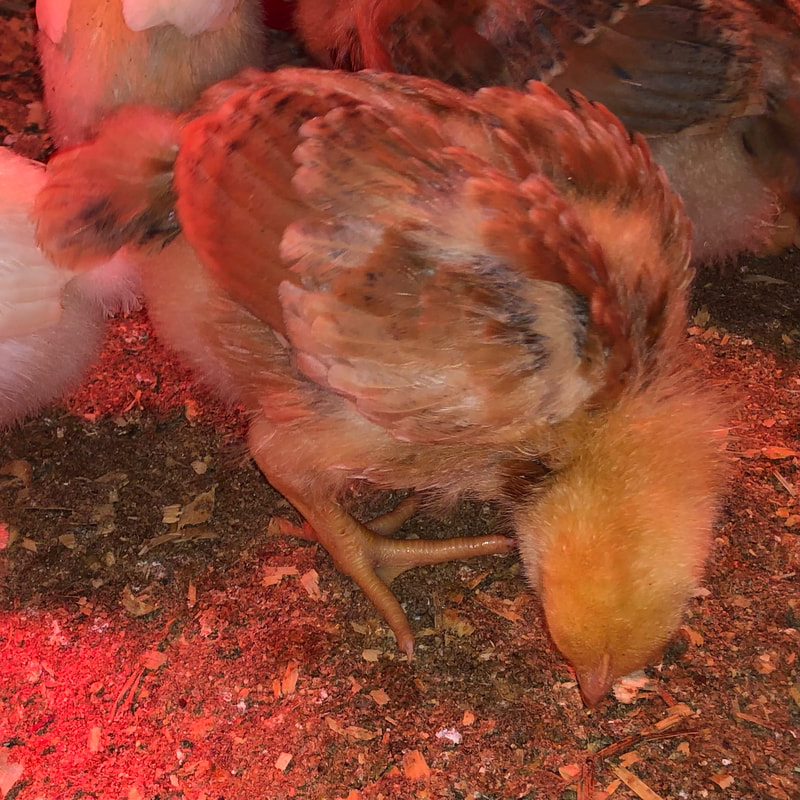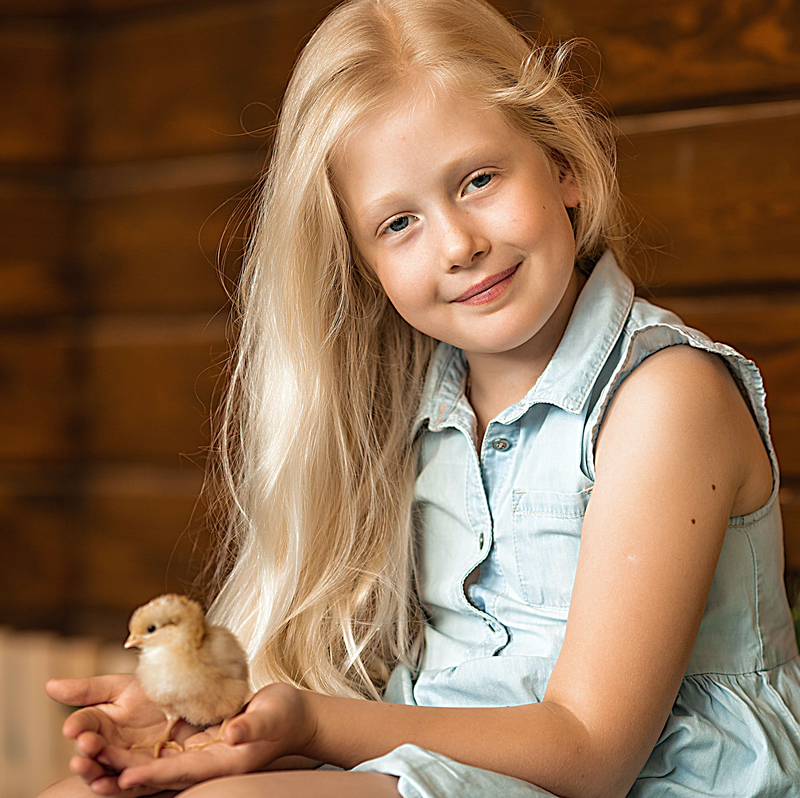Foster farm Chicks. Meet some Chicks from the Edge: FAQs
You work. You have kids. They have energy. They are curious.
Now what?
Pull those little eyes and cheeks out of the electronic screens and focus them out here - to a curious energetic chick that wants your kids' time and attention. Nurture a life for wholesome fun, amazing transformations, and valuable education.
Get some frequently asked questions answered here:
What will I get with the Foster Farm Chicks/ Chicks From The Edge Program?
You'll get:
- 3 healthy baby chicks
- 1 heat lamp and bulb
- 1 bag of chick food
- 1 set of bedding
- Directions for set up and a healthy start
- A scheduled chick pick up and return date (can be extended upon request.)
The Edge Farms offers a foster a chick/ rent a chick program, to allow families and kids to enjoy the rapid growth and changing stages of a chicken in the first weeks of its life.
Get some frequently asked questions answered here:
What will I get with the Foster Farm Chicks/ Chicks From The Edge Program?
You'll get:
- 3 healthy baby chicks
- 1 heat lamp and bulb
- 1 bag of chick food
- 1 set of bedding
- Directions for set up and a healthy start
- A scheduled chick pick up and return date (can be extended upon request.)
The Edge Farms offers a foster a chick/ rent a chick program, to allow families and kids to enjoy the rapid growth and changing stages of a chicken in the first weeks of its life.
What happens when we give the chicks back? How humane is your operation?
Often, when hatcheries allow families or school groups to hatch out chicks themselves, once the chicks are returned, they end up being destroyed. This means that even when many farms offer temporary chicks, they kill them once they are returned to the facility.
Because our farm houses a diverse flock that is outdoors for most of its life, our birds have a better disease resistance then most conventionally housed flocks. We do not engage in practices that immediately destroy the chicks - both male and female that come back to our flock. They get re-integrated into the flocks, after checking they are still healthy. They jump back into day-to-day operations to make friends and live out their life.
While we cannot guarantee that you will recognize your fostered birdies on future farm tours (they keep growing and changing,) we can say confidently that they will have many happy days ahead of them. That is why as of 2023, the Delaware County 4-H Program reached out to partner with us as the home for all their future chickens that hatch in the area's elementary school science classrooms!
What do I get in my chick kit?
When you sign up for Chicks from The Edge Program, you will receive three baby chicks! You will also get supplies including a set of bedding, a heat lamp, and baby chicken feed in a bag, along with a list of best practices to set them up for success.
You can provide the tote or brooder box of your preference, and the water/ food dishes for your chick.
I have other pets - what if they bother or hurt the chicks?
The good news is that chicks don't want or need silence to grow well. Life can be loud or disruptive or surprising! That's all important for a growing bird (and kiddo) to know - what they want most is shelter with warmth, food & water, and a good dose of love!
It's true, other pets are sometimes surprised or threatened by the introduction of new animals or members of a household.
What often works best is to either put the chicks into a glass aquarium with a screened top, or large plastic tote, so they can be viewed safely away from other critters. Also, a cardboard box inside of a wire pet cage will frequently work well. That way they can be viewed and handled during supervised times, without having to worry about Fido scaring them or disturbing them as much.
What happens if a chick gets sick or dies?
The chicks you receive will be healthy happy birdies. There is a very low mortality rate. If, however, a chick dies while you are fostering it, you will not be charged. While no one wants to see this happen, sometimes the reality is that certain birds do not thrive.
We can replace it, when we have chicks available, free of charge. Just let us know and we will arrange for a replacement for the remainder of your time.
What if there is a rooster, will it crow?
Most of the chicks we foster out are female, as they will be future egg layers in our flocks.
In general, baby chicks are very quiet and even if it were a male, it would be too young to crow. Most to do not begin crowing until three or four months of age, so you won't have to worry about bothering neighbors with natural alarm clocks going off at the wrong time!
Why do we get three chicks? Can we order more than that for class observation?
Yes! We offer additional chicks for a small added charge.
A minimum of three chicks is recommended, so that as they grow they can huddle together to maintain warmth, and they get familiar with the site and sound of other chickens who are growing along with them.
It is fascinating to watch social interactions between the birds, and we find it provides a more enriching experience for both the babies and the humans fostering them.
“I have fallen in love, we can't give them back... We want to continue raising the chicks.”
Some people love chickens so much they become family - they don’t want to give back the birdies once the month is done! Do you want to keep them as they continue to get larger?
After growing up for a month, if you want to keep the chicks, contact us at least the week before you are scheduled return them.
You can choose to extend the Chicks From The Edge program for a second month, or buy them permanently. During the extra month, you must purchase additional feed from us, and we'll provide a new set of instructions for caring for their changing needs as far as diet, heat, etc.
After one or two months, they will have enough feathers that the heat lamp is no longer needed. Luckily, as the weather gets warmer, they could soon be able to take supervised field trips outside.
What's the bigger picture? Why is this program important on a large scale?
In addition to introducing people to the mesmerizing world of birds up close, there is a much bigger need for this service in our country and the world today.
Back in the 1940s, the US government actually encouraged families to raise a few household chickens each, to provide for their food security: eggs on a regular basis.
Back then, there were not super-duper grocery stores, and people knew exactly what was feeding them, because each family often produced at least some of their own food. Have you heard of victory gardens?
Fast forward, today people all over North America and especially in cities, are far removed from day today food production, and domesticated pets are often families' only animal companions. Luckily backyard vegetable gardens are springing up again.
We created this program as an easy chance for families to experience first hand, the joy of caring for others and watching the miracle of new life unfold. This limited amount of responsibility pulls young kids excitedly out of electronic gadgets, to interact with their natural environment, and helps duck HOA restrictions if you have them! (Shhh don't tell anyone.)
BEWARE: We joke that chickens are the gateway drug to farming! Something amazing may take root! Our hope is to contribute to growing future farmers or at least a love for the interconnections within our natural world.
Often, when hatcheries allow families or school groups to hatch out chicks themselves, once the chicks are returned, they end up being destroyed. This means that even when many farms offer temporary chicks, they kill them once they are returned to the facility.
Because our farm houses a diverse flock that is outdoors for most of its life, our birds have a better disease resistance then most conventionally housed flocks. We do not engage in practices that immediately destroy the chicks - both male and female that come back to our flock. They get re-integrated into the flocks, after checking they are still healthy. They jump back into day-to-day operations to make friends and live out their life.
While we cannot guarantee that you will recognize your fostered birdies on future farm tours (they keep growing and changing,) we can say confidently that they will have many happy days ahead of them. That is why as of 2023, the Delaware County 4-H Program reached out to partner with us as the home for all their future chickens that hatch in the area's elementary school science classrooms!
What do I get in my chick kit?
When you sign up for Chicks from The Edge Program, you will receive three baby chicks! You will also get supplies including a set of bedding, a heat lamp, and baby chicken feed in a bag, along with a list of best practices to set them up for success.
You can provide the tote or brooder box of your preference, and the water/ food dishes for your chick.
I have other pets - what if they bother or hurt the chicks?
The good news is that chicks don't want or need silence to grow well. Life can be loud or disruptive or surprising! That's all important for a growing bird (and kiddo) to know - what they want most is shelter with warmth, food & water, and a good dose of love!
It's true, other pets are sometimes surprised or threatened by the introduction of new animals or members of a household.
What often works best is to either put the chicks into a glass aquarium with a screened top, or large plastic tote, so they can be viewed safely away from other critters. Also, a cardboard box inside of a wire pet cage will frequently work well. That way they can be viewed and handled during supervised times, without having to worry about Fido scaring them or disturbing them as much.
What happens if a chick gets sick or dies?
The chicks you receive will be healthy happy birdies. There is a very low mortality rate. If, however, a chick dies while you are fostering it, you will not be charged. While no one wants to see this happen, sometimes the reality is that certain birds do not thrive.
We can replace it, when we have chicks available, free of charge. Just let us know and we will arrange for a replacement for the remainder of your time.
What if there is a rooster, will it crow?
Most of the chicks we foster out are female, as they will be future egg layers in our flocks.
In general, baby chicks are very quiet and even if it were a male, it would be too young to crow. Most to do not begin crowing until three or four months of age, so you won't have to worry about bothering neighbors with natural alarm clocks going off at the wrong time!
Why do we get three chicks? Can we order more than that for class observation?
Yes! We offer additional chicks for a small added charge.
A minimum of three chicks is recommended, so that as they grow they can huddle together to maintain warmth, and they get familiar with the site and sound of other chickens who are growing along with them.
It is fascinating to watch social interactions between the birds, and we find it provides a more enriching experience for both the babies and the humans fostering them.
“I have fallen in love, we can't give them back... We want to continue raising the chicks.”
Some people love chickens so much they become family - they don’t want to give back the birdies once the month is done! Do you want to keep them as they continue to get larger?
After growing up for a month, if you want to keep the chicks, contact us at least the week before you are scheduled return them.
You can choose to extend the Chicks From The Edge program for a second month, or buy them permanently. During the extra month, you must purchase additional feed from us, and we'll provide a new set of instructions for caring for their changing needs as far as diet, heat, etc.
After one or two months, they will have enough feathers that the heat lamp is no longer needed. Luckily, as the weather gets warmer, they could soon be able to take supervised field trips outside.
What's the bigger picture? Why is this program important on a large scale?
In addition to introducing people to the mesmerizing world of birds up close, there is a much bigger need for this service in our country and the world today.
Back in the 1940s, the US government actually encouraged families to raise a few household chickens each, to provide for their food security: eggs on a regular basis.
Back then, there were not super-duper grocery stores, and people knew exactly what was feeding them, because each family often produced at least some of their own food. Have you heard of victory gardens?
Fast forward, today people all over North America and especially in cities, are far removed from day today food production, and domesticated pets are often families' only animal companions. Luckily backyard vegetable gardens are springing up again.
We created this program as an easy chance for families to experience first hand, the joy of caring for others and watching the miracle of new life unfold. This limited amount of responsibility pulls young kids excitedly out of electronic gadgets, to interact with their natural environment, and helps duck HOA restrictions if you have them! (Shhh don't tell anyone.)
BEWARE: We joke that chickens are the gateway drug to farming! Something amazing may take root! Our hope is to contribute to growing future farmers or at least a love for the interconnections within our natural world.
